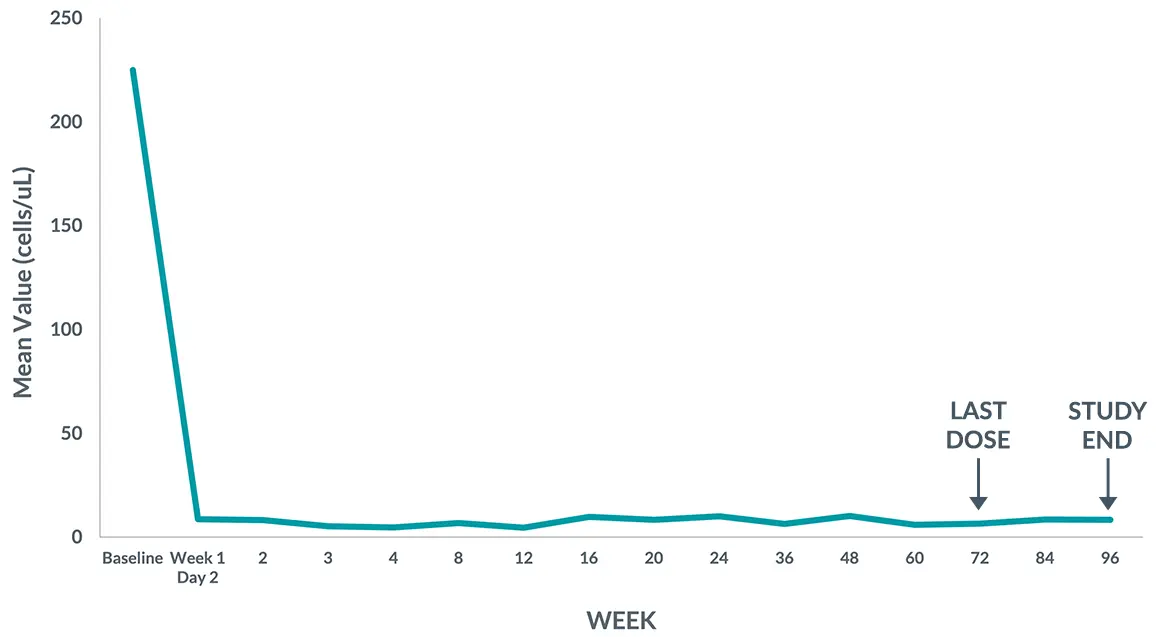BRIUMVI DESIGN
Are you a Healthcare Professional or a Patient or Care Partner?
BRIUMVI DESIGN
Glycoengineering excludes certain sugar molecules that can interfere with the binding of the Fc region to the NK cell.1,3 Absence of these sugar molecules increases affinity for the NK cells with the goal of efficient B-cell depletion.2
The precise mechanism by which BRIUMVI exerts its therapeutic effects is unknown.1
Fc=fragment crystallizable
NK=Natural Killer
B-cell depletion: a pooled post hoc analysis of ULTIMATE I and II4

ARR for BRIUMVI observed in the ULTIMATE I and II identical 2-year Phase 3 trials with 543 patients treated with BRIUMVI and 546 treated with teriflunomide. The ARR for Study 1: 0.076 for BRIUMVI vs 0.188 for teriflunomide (P<0.001) and for Study 2: 0.091 for BRIUMVI vs 0.178 for teriflunomide (P=0.002).1,2
References: 1. BRIUMVI. Prescribing information. TG Therapeutics Inc; 2022. 2. Steinman L, Fox E, Hartung H-P, et al. Ublituximab versus teriflunomide in relapsing multiple sclerosis. N Engl J Med. 2022;387(8):704-714. doi:10.1056/NEJMoa2201904. 3. Whittam DH, Tallantyre EC, Jolles S, et al. Rituximab in neurological disease: principles, evidence and practice. Pract Neurol. 2019:19(1):5-20. doi:10.1136/practneurol-2018-001899. 4. Fox EJ, Steinman L, Hartung H-P, et al. Pharmacodynamics of B-cell depletion and pharmacokinetics of the novel anti-CD20 monoclonal antibody ublituximab in patients with relapsing multiple sclerosis. Poster presented at: 2022 Americas Committee for Treatment and Research in Multiple Sclerosis; February 24-26, 2022; West Palm Beach, FL.
Call 1-833-BRIUMVI (1-833-274-8684) to speak with a BRIUMVI Patient Support
Case Manager (Mon-Fri, 8 AM to 8 PM ET)
Indication and Important Safety Information
IMPORTANT SAFETY INFORMATION
Contraindication: BRIUMVI is contraindicated in patients with:
WARNINGS AND PRECAUTIONS
Infusion Reactions:
BRIUMVI can cause infusion reactions, which can include pyrexia, chills, headache, influenza-like illness, tachycardia, nausea, throat irritation, erythema, and an anaphylactic reaction. In MS clinical trials, the incidence of infusion reactions in BRIUMVI-treated patients who received infusion reaction-limiting premedication prior to each infusion was 48%, with the highest incidence within 24 hours of the first infusion. 0.6% of BRIUMVI-treated patients experienced infusion reactions that were serious, some requiring hospitalization.
Observe treated patients for infusion reactions during the infusion and for at least one hour after the completion of the first two infusions unless infusion reaction and/or hypersensitivity has been observed in association with the current or any prior infusion. Inform patients that infusion reactions can occur up to 24 hours after the infusion. Administer the recommended pre-medication to reduce the frequency and severity of infusion reactions. If life-threatening, stop the infusion immediately, permanently discontinue BRIUMVI, and administer appropriate supportive treatment. Less severe infusion reactions may involve temporarily stopping the infusion, reducing the infusion rate, and/or administering symptomatic treatment.
Infections: Serious, life-threatening or fatal, bacterial and viral infections have been reported in BRIUMVI-treated patients. In MS clinical trials, the overall rate of infections in BRIUMVI-treated patients was 56% compared to 54% in teriflunomide-treated patients. The rate of serious infections was 5% compared to 3% respectively. There were 3 infection-related deaths in BRIUMVI-treated patients. The most common infections in BRIUMVI-treated patients included upper respiratory tract infection (45%) and urinary tract infection (10%). Delay BRIUMVI administration in patients with an active infection until the infection is resolved.
Consider the potential for increased immunosuppressive effects when initiating BRIUMVI after immunosuppressive therapy or initiating an immunosuppressive therapy after BRIUMVI.
Hepatitis B Virus (HBV) Reactivation: HBV reactivation occurred in an MS patient treated with BRIUMVI in clinical trials. Fulminant hepatitis, hepatic failure, and death caused by HBV reactivation have occurred in patients treated with anti-CD20 antibodies. Perform HBV screening in all patients before initiation of treatment with BRIUMVI. Do not start treatment with BRIUMVI in patients with active HBV confirmed by positive results for HBsAg and anti-HB tests. For patients who are negative for surface antigen [HBsAg] and positive for HB core antibody [HBcAb+] or are carriers of HBV [HBsAg+], consult a liver disease expert before starting and during treatment.
Progressive Multifocal Leukoencephalopathy (PML): Although no cases of PML have occurred in BRIUMVI-treated MS patients, JCV infection resulting in PML has been observed in patients treated with other anti-CD20 antibodies and other MS therapies.
If PML is suspected, withhold BRIUMVI and perform an appropriate diagnostic evaluation. Typical symptoms associated with PML are diverse, progress over days to weeks, and include progressive weakness on one side of the body or clumsiness of limbs, disturbance of vision, and changes in thinking, memory, and orientation leading to confusion and personality changes.
MRI findings may be apparent before clinical signs or symptoms; monitoring for signs consistent with PML may be useful. Further investigate suspicious findings to allow for an early diagnosis of PML, if present. Following discontinuation of another MS medication associated with PML, lower PML-related mortality and morbidity have been reported in patients who were initially asymptomatic at diagnosis compared to patients who had characteristic clinical signs and symptoms at diagnosis.
If PML is confirmed, treatment with BRIUMVI should be discontinued.
Vaccinations: Administer all immunizations according to immunization guidelines: for live or live-attenuated vaccines at least 4 weeks and, whenever possible at least 2 weeks prior to initiation of BRIUMVI for non-live vaccines. BRIUMVI may interfere with the effectiveness of non-live vaccines. The safety of immunization with live or live-attenuated vaccines during or following administration of BRIUMVI has not been studied. Vaccination with live virus vaccines is not recommended during treatment and until B-cell repletion.
Vaccination of Infants Born to Mothers Treated with BRIUMVI During Pregnancy: In infants of mothers exposed to BRIUMVI during pregnancy, assess B-cell counts prior to administration of live or live-attenuated vaccines as measured by CD19+ B-cells. Depletion of B-cells in these infants may increase the risks from live or live-attenuated vaccines. Inactivated or non-live vaccines may be administered prior to B-cell recovery. Assessment of vaccine immune responses, including consultation with a qualified specialist, should be considered to determine whether a protective immune response was mounted.
Fetal Risk: Based on data from animal studies, BRIUMVI may cause fetal harm when administered to a pregnant woman. Transient peripheral B-cell depletion and lymphocytopenia have been reported in infants born to mothers exposed to other anti-CD20 B-cell depleting antibodies during pregnancy. A pregnancy test is recommended in females of reproductive potential prior to each infusion. Advise females of reproductive potential to use effective contraception during BRIUMVI treatment and for 6 months after the last dose.
Reduction in Immunoglobulins: As expected with any B-cell depleting therapy, decreased immunoglobulin levels were observed. Decrease in immunoglobulin M (IgM) was reported in 0.6% of BRIUMVI-treated patients compared to none of the patients treated with teriflunomide in RMS clinical trials. Monitor the levels of quantitative serum immunoglobulins during treatment, especially in patients with opportunistic or recurrent infections, and after discontinuation of therapy until B-cell repletion. Consider discontinuing BRIUMVI therapy if a patient with low immunoglobulins develops a serious opportunistic infection or recurrent infections, or if prolonged hypogammaglobulinemia requires treatment with intravenous immunoglobulins.
Most Common Adverse Reactions: The most common adverse reactions in RMS trials (incidence of at least 10%) were infusion reactions and upper respiratory tract infections.
INDICATION
BRIUMVI is indicated for the treatment of relapsing forms of multiple sclerosis (MS), to include clinically isolated syndrome, relapsing-remitting disease, and active secondary progressive disease, in adults.
Are you a Healthcare Professional or a Patient or Care Partner?
Indication and Important Safety Information
INDICATION: BRIUMVI is indicated for the treatment of relapsing forms of multiple sclerosis (MS), to include clinically isolated syndrome, relapsing-remitting disease, and active secondary progressive disease, in adults.
IMPORTANT SAFETY INFORMATION: Contraindication: BRIUMVI is contraindicated in patients with:
- Active HBV infection
- A history of life-threatening infusion reaction to BRIUMVI
|
|
These infusion reactions can happen
over 24 hours after your infusion. It is important that
you call your healthcare provider right away if you get any of the
signs or symptoms listed above after each infusion. If you get an
infusion reaction, your healthcare provider may need to stop or slow
down the rate of your infusion.
What are the possible side effects of BRIUMVI?
The most common side effects of
BRIUMVI include:
For more important information, go to www.briumvi.com or call 1-833-BRIUMVI (1-833-274-8684).
